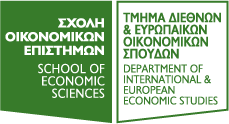Spring Semester 2023-2024
-
Date:06/02/2024 - 15:30 - 17:00

Title: "Private Colonialism in Africa"
Speaker: Professor Elias Papaioannou, London School of Economics
Host: Assistant Professor Kospentaris Ioannis, Department of Economics, Athens University of Economics and Business
Venue: 2 Troias, Kimolou and Spetson Street, Room T101
-
Date:08/02/2024 - 15:30 - 17:00

Title: "The Role of Wages and Fringe Benefits in Job Search: Evidence from a Large-Scale Online Field Experiment"
Speaker: Assistant Professor Andreas Gulyas, University of Mannheim
Host: Assistant Professor Kospentaris Ioannis, Department of Economics, Athens University of Economics and Business
Venue: 2 Troias, Kimolou and Spetson Street, Room T101
-
Date:29/02/2024 - 15:30 - 17:00

Title: "A Microfounded Approach to Currency Substitution and Government Policy"
Speaker: Assistant Professor of Economics Florian Madison, Claremont McKenna College
Host: Assistant Professor Kospentaris Ioannis, Department of Economics, Athens University of Economics and Business
Venue: 2 Troias, Kimolou and Spetson Street, Room T101
Attachments:
 PDF of Relevant Paper
PDF of Relevant PaperAbstact: This paper develops a search-theoretic dynamic dual-currency model featuring endogenous currency substitution as a function of jointly-determined fiscal and monetary policy. Benevolent governments, unable to commit to future policies, weigh distortion-smoothing and time-consistency, where steady-state public expenditures, public debt, labor taxation, and inflation are determined using the notion of a Markov-perfect equilibrium. Currency substitution arises endogenously following cross-country differences in fundamentals, characterizing the relationship between payment patterns, fiscal, and monetary policy. An extension incorporating 'de jure' dollarization eliminates time-consistency concerns and reduces the objective of the government to distortion-smoothing exclusively.
-
Date:07/03/2024 - 15:30 - 17:00

Title: "Electable and Stable Insiders’ Coalition Governments"
Speaker: Tryphon Kollintzas, Athens University of Economics and Business
Host: Assistant Professor Kospentaris Ioannis, Department of Economics, Athens University of Economics and Business
Venue: 2 Troias, Kimolou and Spetson Street, Room T101
Attachments:
 PDF of Relevant Paper
PDF of Relevant PaperAbstact: In this paper, we formulate a general equilibrium theory that explains the existence and stability of democratically elected governments that support certain groups of individuals in society (insiders) to the detriment of everybody else (outsiders), even if the latter constitute a majority. The vehicle is a dynamic general equilibrium model, where insiders get monopoly rents and outsiders get less than what they would have gotten under a common good regime. We construct such political economy equilibria and we identify the conditions under which such political regimes (coalitions of insiders): (a) can safeguard against opportunistic behavior (i.e., do not fall from within) and (b) may come to power in the first place (i.e., manage to get elected). To that end, we highlight the role of ideology or self-serving bias as a gluing device to garner an electable coalition.
-
Date:26/03/2024 - 12:30 - 14:00

Title: "The Local Effects of Artificial Intelligence: Evidence from the Municipal Bond Market"
Speaker: Assistant Professor Emmanouil Chatzikonstantinou, Georgetown University, Qatar
Host: Assistant Professor Kospentaris Ioannis, Department of Economics, Athens University of Economics and Business
Venue: 76, Patission Str., Antoniadou Wing, 3rd floor, Room A36
-
Date:26/03/2024 - 15:30 - 17:00

Title: "Output Dynamics and Private Sector Borrowing during Sovereign Debt Crises"
Speaker: Tamon Asonuma, International Monetary Fund, Washington DC, USA
Host: Professor Evangelos Vassilatos, Head of the Department of Economics, Athens University of Economics and Business
Venue: 76, Patission Str., Antoniadou Wing, 3rd floor, Room A32
Attachments:
 PDF of Presentation
PDF of PresentationAbstract: Output dynamics and private sector access vary across sovereign debt restructurings with foreign private creditors. We compile data on sovereigns’ private sector borrowing from sovereign’ foreign creditor chair countries in 1977–2020. We find that (i) sovereigns with high private sector borrowing from sovereigns’ creditor chair countries choose a preemptive restructuring; (ii) private sector borrowing from sovereigns’ creditor chair countries declines mildly in preemptive restructurings while sharply in post-default restructurings. We build sovereign debt model with endogenous choice of preemptive and post-default renegotiations, output dynamics and private sector access. Our model quantitatively shows that the sovereign’s choice of preemptive or post-default restructuring affects differently the foreign creditor’s net worth and lending to the sovereign’s private sector, and, in turn, this results in different output dynamics. Data support theoretical predictions.
-
Date:28/03/2024 - 15:30 - 17:00

POSTPONED
Title: "TBA"
Speaker: Dr. Romanos Priftis, European Central Bank
Host: Assistant Professor Kospentaris Ioannis, Department of Economics, Athens University of Economics and Business
Venue: 76, Patission Str., Antoniadou Wing, 3rd floor, Room A36
-
Date:04/04/2024 - 15:30 - 17:00
 Title: "Threshold Regression in Heterogeneous Panel Data with Interactive Fixed Effects"
Title: "Threshold Regression in Heterogeneous Panel Data with Interactive Fixed Effects"Speaker: Professor Yiannis Karavias, Brunel University London
Host: Assistant Professor Alexopoulos Angelos, Department of Economics, Athens University of Economics and Business
Venue: 76, Patission Str., Antoniadou Wing, 3rd floor, Room A36
Attachments:
 PDF of Relevant Paper
PDF of Relevant PaperAbstact: This paper introduces unit-specific heterogeneity in panel data threshold regression. Both slope coefficients and threshold parameters are allowed to vary by unit. The heterogeneous threshold parameters manifest via a unit-specific empirical quantile transformation of a common underlying threshold parameter which is estimated efficiently from the whole panel. In the errors, the unobserved heterogeneity of the panel takes the general form of interactive fixed effects. The newly introduced parameter heterogeneity has implications for model identification, estimation, interpretation, and asymptotic inference. The assumption of a shrinking threshold magnitude now implies shrinking heterogeneity and leads to faster estimator rates of convergence than previously encountered. The asymptotic theory for the proposed estimators is derived and Monte Carlo simulations demonstrate its usefulness in small samples. The new model is employed to examine the FeldsteinHorioka puzzle and it is found that the trade liberalization policies of the 80’s significantly impacted cross-country capital mobility
-
Date:18/04/2024 - 15:30 - 17:00

Title: "Song of Refugees"
Paper coauthored by Stelios Michalopoulos (Brown University) and Elias Papaioannou (London Business School)Speaker: Assistant Professor Vasilis Logothetis, University of Ioannina
Host: Assistant Professor Kospentaris Ioannis, Department of Economics, Athens University of Economics and Business
Venue: 76, Patission Str., Antoniadou Wing, 3rd floor, Room A36
-
Date:30/05/2024 - 15:30 - 17:00

Title: "Elections for sale? Evidence from Italian local elections"
Speaker: Giacomo Davide De Luca, Professor of Economics - Free University of Bozen-Bolzano
Host: Assistant Professor Vassilis Sarantides, Department of Economics, Athens University of Economics and Business
Venue: 76, Patission Str., Antoniadou Wing, 3rd floor, Room A36
Abstact: This paper studies the dynamics of electoral corruption in the context of local elections in Italy. It exploits the asynchronous nature in the timing of mayoral elections to estimate a relationship between elections and the municipality-level amount exchanged through cash transactions. Cash transactions are sourced from a unique comprehensive dataset, taken from the Aggregate Anti-Money Laundering (AML) Reports between 2008 and 2018, which all Italian financial intermediaries are mandated to file with reference to transactions worth euros 15,000 or more. The difference-in-difference estimates, including municipality and time fixed effects, suggest that the municipal elections in Italy systematically trigger an anomalous increase in the volume of cash transactions, which we interpret as evidence of electoral corruption, i.e. an intense circulation of money to secure electoral support in the shadow of the law. Exploring the heterogeneity of our main result along several potential mediating factors confirms some intuitively appealing patterns, such as tighter competition, the presence of active criminal organizations, as well as the size of the municipality budget, let us show which significantly affects the volume of cash transactions.





 Πατησίων 76
Πατησίων 76 2108203 106 / 2108203 107
2108203 106 / 2108203 107
